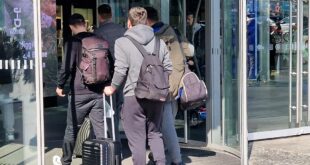Souleymane Diallo says his journey to reach Italy from Guinea “is hard to narrate because it is truly horrible, although it remains part of my life.” His trip, which he described during a meeting in Rome last week, is a story of death, suffering, slavery and hope for a better future.
Souleymane Diallo comes from Guinea. “I was born on 1 January 1985 in Gaoual, a small city in the northwest of the country,” he said. The young man, who reached Italy in February this year by crossing the Mediterranean, belongs to the Peulh ethnic group and is a Muslim, like his mother, father and four siblings.
When he was little, he went to live with an uncle in the capital Conakry so he could study. “I went to school until university but from time to time I would go to Siguiri to visit my family.” In the period leading to the 2010 presidential elections in the country, Souleymane’s family backed Cellou Dalein Diallo, the Peulh candidate.
One day, Souleymane was visiting family because his mother was sick. “A group of people broke into our home with sticks and machetes and slaughtered my family. I survived because I was sleeping in the home next to mine.”

Souleymane was able to run away with a friend’s help and after a few days returned to Conakry and told his uncle what had happened. After four months, “we decided to report the case to the police, but unfortunately police in my country did not accept the complaint. They told us to go away, saying members of the Peulh group have no rights.”
Shortly after they reported the case to police, Souleymane’s uncle was killed. “I got scared and decided to leave the country.”
Slavery in Libya and arrival in Italy
Souleymane lived for six months in Senegal and then he moved to Mali, where he stayed with a friend for five months. His friend, he said, helped him reach Libya “after a 20-day trip that was very dangerous, with no food and water,” through the Sahara desert.
“I will never forget that time,” he said. Souleymane reached Libya in February 2012 and was captured in Bani Walid by an armed group. “They asked me for money in exchange for freedom, but because I couldn’t pay, they forced me to work for four years, I was abducted,” he said, showing a scar on one eye.
“It was a horrible time. They did many things to me. One day, a member of the armed gang asked me whether I was Muslim. I said yes and he told me that I was black and that blacks had no right to follow religions.” For four years Souleymane he worked from 8 am until 11 pm daily and living on just one meal every day.
After four years of slavery, Souleymane was able to flee, first to Tripoli and then to Sabratha, where he boarded a boat for Italy. He arrived in Lampedusa on 3 February 2017. “I feel better now,” he said, adding that unfortunately, he still had many many friends who were still in Libya and that the situation there remained dangerous.
© ANSA
 THE AFRICAN COURIER. Reporting Africa and its Diaspora! The African Courier is an international magazine published in Germany to report on Africa and the Diaspora African experience. The first issue of the bimonthly magazine appeared on the newsstands on 15 February 1998. The African Courier is a communication forum for European-African political, economic and cultural exchanges, and a voice for Africa in Europe.
THE AFRICAN COURIER. Reporting Africa and its Diaspora! The African Courier is an international magazine published in Germany to report on Africa and the Diaspora African experience. The first issue of the bimonthly magazine appeared on the newsstands on 15 February 1998. The African Courier is a communication forum for European-African political, economic and cultural exchanges, and a voice for Africa in Europe.

















